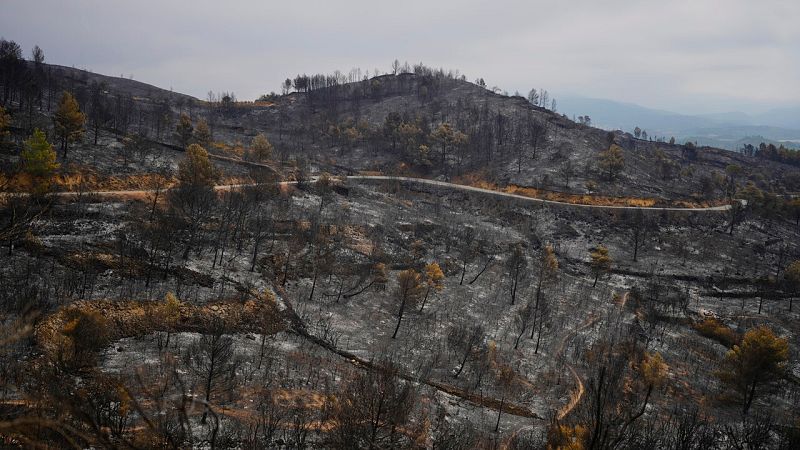
Wildfires Continue to Challenge Firefighters Across Southern Europe
Wildfires are intensifying across southern Europe as the region experiences record-breaking heat, creating a dangerous environment for both residents and emergency responders. Firefighters in multiple countries are working tirelessly to contain blazes, while authorities warn that the situation could worsen with the ongoing high temperatures.
In France, approximately 1,400 firefighters were deployed in the Aude region on Saturday to prevent what is considered the country's largest wildfire in decades from reigniting. After burning over 160 square kilometers of forested land, the fire has been contained since Thursday. However, the threat remains, as officials continue to monitor potential hotspots. Residents who had previously evacuated were allowed to return to their homes, but access to the forest area remains strictly prohibited.
Aude prefect Christian Pouget emphasized that the battle against the fire is far from over. “The fight is continuing, firefighters are still working on (fire) re-ignition,” he said during a news conference. The blaze has already claimed one life and injured 25 people, including 19 firefighters. With temperatures expected to reach up to 39°C in the region, the situation is expected to remain challenging for weeks.
Meteo France has placed the southern half of the country under a high vigilance alert for heat waves, warning of extreme conditions that could further complicate firefighting efforts.
Fires Persist in Spain and Greece
Firefighters in Spain are also dealing with an active wildfire in Avila province. The fire started on Friday afternoon and has been a focus of the Spanish Military Emergencies Unit (UME), which worked through the night to control its spread and prevent it from reaching roads and train lines. High temperatures, reaching nearly 39°C in some areas, have increased the risk of fires, with the heat wave expected to last until at least next Wednesday.
In Greece, a large wildfire broke out near Keratea, about 40 kilometers southeast of Athens, and continued to burn through eastern and southern Attica. The fire caused significant damage to homes and resulted in one fatality. Authorities issued evacuation orders as the blaze approached residential areas, and over 260 firefighters, supported by 77 vehicles, worked to contain the flames. Volunteers and civilians also played a crucial role in the affected regions.
Wildfires in Turkey Under Control
In Turkey, wildfires in the central districts of Canakkale and the Bayramic area have largely been brought under control, according to Agriculture and Forestry Minister Ibrahim Yumakli. Firefighting teams worked throughout the night to halt the spread of the blazes, which had initially broken out near Yigitler village. Precautionary evacuations were carried out in several villages, with 654 residents relocated to safe zones. Four suspects have been taken into custody as part of the investigation into the cause of the fires.
Climate Change Intensifies Wildfire Threats
Southern Europe has seen a series of large wildfires this summer, raising concerns among scientists about the role of climate change in increasing the frequency and intensity of heat and dryness. This makes the region more vulnerable to such disasters.
The UN World Meteorological Organisation (WMO) recently released a report highlighting the global impact of extreme heat. It noted that between 2000 and 2019, extreme temperatures caused around 489,000 heat-related deaths annually, with 36% occurring in Europe. In July alone, Turkey recorded a new national high of 50.5°C, while Sweden and Finland experienced prolonged periods of temperatures above 30°C.
The WMO warns that urgent action is needed to adapt to climate change and limit global warming in line with the 2015 Paris Agreement. “Extreme heat is sometimes called the silent killer, but with today’s science, data and technologies, silence is no longer an excuse. Every single death from extreme heat is preventable,” said WMO Deputy Secretary-General Ko Barrett.
The organization estimates that scaling up heat-health warning systems in 57 countries could save nearly 100,000 lives each year. “This is not just a climate issue, it’s a public health emergency,” added Joy Shumake-Guillemot, lead of the WHO-WMO Climate and Health Joint Programme.
